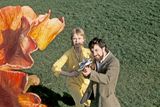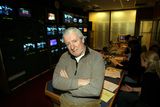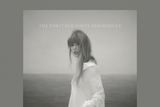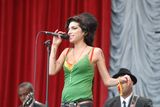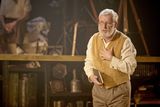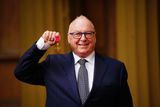Boris 'Boom Boom' Becker gets ho-hum
Boris Becker's Wimbledon: My life and career at the All-England Club, Boris Becker, Blink, €15
File photo dated 02/10/14 of Boris Becker, as the tennis star has opened up about his famous sexual liaison at Nobu restaurant - saying that he is happy if the brief encounter is one of the things he is best remembered for
What a roller coaster (sea-saw tie-break?) of a life it's been for Boris Becker: from wholesome symbol of modern Germany, to scandalous playboy and back again. In retirement he was reinvented as an elder statesman of the game, albeit one with a residual whiff of the 'dogged ladies man' about him. Then, in recent years, via the finishing school of BBC commentary, he became Novak Djokovic's coach-mentor, which further burnished the second coat of respectability.
It all leads up to this book, Boris Becker's Wimbledon which comes out on the 30th anniversary of his first SW19 win and which deals more with the classy tennis icon aspect of Becker's life to the exclusion of the tawdry tabloid star of the noughties. Basically he's offering you more insights into playing Stefan Edberg and less insights into how he got that girl pregnant in a broom closet (for those you would more properly have to go back to his earlier autobiography, The Player, which, judging by his recent interview with Lynn Barber, he would rather forget).
As sports books go then this tome pretty much ticks all of the boxes. Becker sketches out his emergence as a strapping wunderkind at Wimbledon in 1984 where an injury stopped him. He returned the following year and won the title as a 17-year-old, becoming the youngest ever winner of the men's championships. 1980s men's tennis was dominated by the cyborg-like figures of Ivan Lendl and Becker, who with his Hamlet-like self-exhortations during matches, provided a contrast. In the book he discusses at length the visceral, spittle-flecked rivalries he shared with the likes of Agassi and Pat Cash and laments the more peaceable antagonisms that characterise present-day men's tennis. This discussion gives rise to one of the headline-generating moments in the book: Becker's assertion that Djokovic and Federer don't really like each other, that Federer's niceness is a little put on, and that a little open hostility might make good box office. The hostility stuff sounds a little off the mark - men's tennis is more popular now than when Becker was playing, but his claims about Djokovic and Federer not being friends would bear out what Djokovic's own father has said.
The book is not totally bereft of factoids to lure the non-tennis purist. For instance Boom Boom does admit he was addicted to sleeping tablets and that he played some of the matches still halfway coming around from them. It doesn't quite come up to Agassi's revelation that he was addicted to crystal meth, but for this otherwise by-the-numbers sports tome, it certainly qualifies as colour.
Join the Irish Independent WhatsApp channel
Stay up to date with all the latest news

